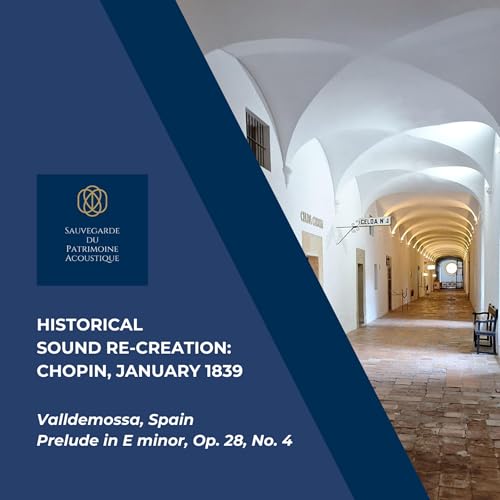[Video https://youtu.be/rOF62U4Rl14]On January 9, 1839, after three weeks of negotiations and a 400 francs contribution, Frédéric Chopin finally received the pianino Camille Pleyel had sent him at the Carthusian monastery of Valldemossa. This small piano was essential for completing his Preludes, Op. 28 during the winter. In this monastic cell, shared with George Sand and her children, Chopin tamed the instrument that allowed him to sculpt sound according to his vision-a sound inseparable from the “silvery, slightly veiled” tone typical of Pleyel pianos.
This video invites you to relive that intimate moment through a historically grounded sound recreation, part of the Acoustic Heritage Preservation Program, developed through three key components:
1. Instrumental ResearchA Pleyel pianino from 1837 (serial no. 6161) was acquired-by chance but fortuitously-due to its technical closeness to Chopin’s Majorcan pianino (serial no. 6668). At Nohant, I recorded single notes from another Pleyel (serial no. 15025, dated 1849), once owned by George Sand. These were originally intended for comparative analysis with Chopin’s lost instrument, to model its acoustic character.
The model used here is a petit patron type (FF-f³, 6 octaves), close to Chopin’s C-f³ range (6½ octaves). However, it cannot play the final low E required in this Prelude. To resolve this, the pianino’s lowest F was tuned down to E, replicating the gravity of the original conclusion.
Remaining faithful to period conditions, some notes were intentionally left slightly detuned. In January 1839, weakened by illness and weighing about 43 kg (at 1.70 m), Chopin likely lacked the strength to use the small tuning key-still preserved in Cell No. 4. Moreover, Pleyel pianinos often detuned in cold, damp climates.
2. Acoustics of Cell No. 4Impulse responses were recorded in Cell No. 4 with its vaulted ceiling. These acoustic profiles were applied to the pianino’s sound-captured in a soundproof booth (The Chopin Echo Chamber)-to recreate the reverberation Chopin might have heard.
3. Soundscape ReconstructionBiophonic and geophonic recordings were made on site in April 2024, matching descriptions from George Sand’s A Winter in Majorca. The rain and thunder were recorded there by myself. These ambient layers place the listener within the setting in which the Prelude was born.
Written in E minor, entirely in four voices, Prelude No. 4 was composed under modest conditions, on the same sheet as the Mazurka Op. 41 No. 1-likely to save paper. It unfolds like a personal liturgy, built on a descending chromatic line echoing Baroque laments, such as Dido’s death in Purcell’s Dido and Aeneas.
This 25-measure piece was chosen by Chopin to be played at his own funeral on October 30, 1849, on the organ, immediately after Mozart’s Requiem.
This project extends the 2023 recordings made at Nohant, capturing soundscapes once heard by George Sand, Chopin, Delacroix, Maurice Sand, and Pauline Viardot-the first sound heritage archive dedicated to a historic monument (submitted to the Centre des Monuments Nationaux, March 18, 2024, ref. 3AV SPAC NV).
This audio file is not merely a performance-it is a documented sonic encounter with a singular moment in 19th-century music history.
Credits © Sauvegarde du Patrimoine Acoustique - 2025 Concept & Production: Nicolas Labatut (2023-2025)
Special thanks to:Gabriel Quetglas-Olin (Museo Chopin y George Sand, Valldemossa), Élisabeth Pezza-Braoun, Franck Blaser, Virginie Cherrier, the team at the George Sand House in Nohant (Centre des Monuments Nationaux - chaired by Marie Lavandier), Théo Bruneau (advanced pianist, Rouen Conservatory), Renée Clancy (voice recording), Bibliothèque Historique de la Ville de Paris, City of Rouen, Frédéric Auger (SACEM), Narodowy Instytut Fryderyka Chopina, Pleyel International (technical and logistical support) Estimated carbon footprint: approx. 1,699 kg CO₂ (mainly due to the Paris-Palma flight)
linktr.ee/patrimoineacoustique
 Jul 6 20253 minutos
Jul 6 20253 minutos Jan 20 202515 minutos
Jan 20 202515 minutos![[ENG] Une journée au fil de la Seine - Embark on a musical journey!](https://m.media-amazon.com/images/I/418uoLmymuL._SL500_.jpg) 15 minutos
15 minutos Dec 20 202257 minutos
Dec 20 202257 minutos Aug 21 202258 minutos
Aug 21 202258 minutos
